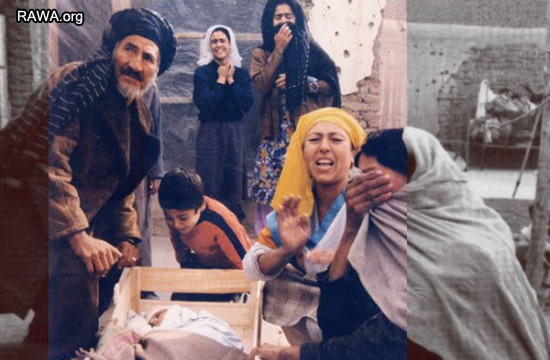By Sohaila Weeda Khamoch & Ali Arash
Twenty years ago a rocket slammed into a house in Kabul robbing a young mother of her child. Time has not been the great healer in her case. A testimony*.
"I was in the house when the rocket attack started. Panic-stricken we ran and hid in the basement of a nursery school next door. I forgot my nine-month-old baby in his cradle," the inconsolable woman, still too scared to reveal her name, recalled.
There was not a scratch on the body when her husband found their child. "My baby died from fear probably," the heartbroken mother says unable to stop the tears rolling down her cheeks as if this had happened only yesterday.
Rival mujahedin factions brought the war to the Afghan capital for the first time during the government of Burhanullah Rabbani who was killed last year by a suicide bomber. Rabbani was president between 1992 and 1996, the year the Taleban marched into Kabul.
When the nursery came under attack the family fled to a mosque in Khairkhana. They stayed one night but moved again to the crowded basement of the police academy, which became a grave for many who sheltered with her. Hit by a rocket the building came down like a pack of cards. The woman remembers that tired and hungry, the family had just opened their food packets to eat when suddenly the room was full of fire and smoke, and pieces of flesh were flying in the air. "That was a place where one of my daughters-in-law was martyred; also a brother-in-law. When the smoke cleared a bit I saw the place was full of dead bodies," she says.

Family mourns dead child killed during 1992-96 civil war between Jehadi factions. More than 65,000 civilians were killed in Kabul and 90% of the city was destroyed. Countless inhumane crimes were also committed by factions' men. (Photo: RAWA.org)
The tears keep flowing as she relives the horrors of a time when Kabul was bombed night and day, and tens of thousands of its residents were killed. There has been no justice for the survivors who have had to carry the painful losses silently in their hearts ever since.
"My child and my daughter-in-law were everything for me in life. How good it would be if they were now with me! My son would be young man, and my daughter-in-law would have more children," says the woman who is lost in her memories.
She counts on her fingers the loss of five relatives in the blink of an eye - the time it took for a rocket to destroy her world until then. The trauma of war not only grayed her prematurely, worry lines have created deep furrows in her forehead. There is an unmistakable sadness in her voice for she has been among the dead and murdered.
"I cannot forget my child or my relatives who were martyred. One of my nephews was only 12. He was frightened to death by the rockets. He had to take the family's sheep into the mountains to graze, and a rocket killed him."
The house, full of people, falls silent as she speaks. The terrible memories cast a pall of gloom all around that is suddenly broken by the frightened wail of a small child. What scared him? Was it the sombre mood of the adults around him? His mother pulls him close to her, to comfort him, and maybe herself.
"A total of 15 relatives were martyred; six of them were from our family. Nothing was available. There was neither water nor bread. We were staying in basements hungry and thirsty. We were living such a hard life, nobody helped us." She does not hide the despair she felt nearly two decades ago.
According to the woman, the civil war years were open season for looters in Kabul. Its starving residents had no protection against the armed men who robbed and murdered people in the midst of the horror of massacres by anti-government mujahedin groups.
"All the things in our house were looted. The house that you see now had nothing. They even removed the doors and windows," she recalls.
She says that driven by fear of the war and killings everyone who could get out of the city did. Many people fled to the rural areas with just a few personal possessions that they could salvage from their ruined homes.
She fled to her village in Jaghori district, Ghazni province. The family walked all the way, a distance of roughly 125 kms from Kabul. "When we left the house we planned to go to our district. No cars or buses were available. We had no shoes. We walked barefoot all the way to our village. We stayed many nights in basements and reached Jaghori through the Turkman valley."
She returned to Kabul only after the Taleban were ousted in end-2001. The trauma of those days haunts her every waking hour. The bombings and death of family members have stayed constant companions. She prays and wishes for permanent peace in Afghanistan. That, she says, is her dream for her country.
* The testimonies of survivors of war crimes are our contribution to creating greater public awareness about people's hopes and claims for justice, reconciliation and peace. These testimonies and life stories are distributed internationally by the news agency IPS-Inter Press Service and are the basis for a radio drama that will start being broadcasted by seven Killid radios from this month.



